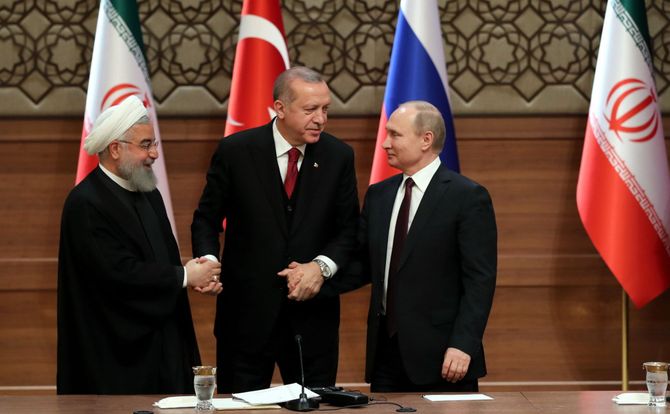Turkey, Iran and the potential for peace in Syria
President Erdogan hosted a summit in Ankara with Russian President Putin and Iranian President Rouhani on April 4. The focus of the meeting was Syria. The move showed how Turkey is renewing efforts to overcome past rivalries and improve relations with its neighbors to solve one of the biggest threats to its interests.

In a nutshell
- Turkey, Russia and Iran might find a solution for the Syrian conflict without the West
This week, Russian President Vladimir Putin traveled to Ankara for a meeting with Turkish President Recep Tayyip Erdogan and then a summit with both Mr. Erdogan and Iranian President Hassan Rouhani. The main topic of the summit was the conflict in Syria.
Syria and Iraq were both once part of the Ottoman Empire, which as a regional power always tried to fend off Iranian influence. Today, the rivalry between Iran and Turkey can be seen clearly in Syria, where the two countries have very different goals. Iran wants to create a Shia corridor through Iraq and Syria to Lebanon and the Mediterranean Sea, which is not in Turkey’s interest.
For these reasons, Iran supports the government of Syrian President Bashar al-Assad, a member of the Alawite sect of Islam, which is close to the Shia branch. Turkey wants the entire Syrian regime replaced.
However, Turkey has difficult relations with many of its neighbors, and it must somehow find a modus vivendi with them.
During the Cold War, Turkey was clearly an ally of the United States and Western Europe. Now it is rather isolated. The unsettled situations in Syria and Iraq present a danger to Turkish interests. Russia, which was never a friend of Turkey, is trying to find a settlement in Syria. Moreover, with the exception of the Syria obstacle, Turkey and Russia have recently tried to build better relations. Trade is increasing between the two countries and Turkey is building a nuclear power plant at Akkuyu, in the country’s south, with Russian technology – Presidents Erdogan and Putin visited the site. Turkey is also acquiring the S-400 air defense missile system from Russia.
Turkey must find a way to keep relations with its neighbors on an even keel.
NATO is worried that its second-largest member is acquiring Russian defense equipment. But, as mentioned above, Turkey must find a way to keep relations with its neighbors on an even keel. Also, Iran has the same objective as Russia in Syria: to achieve peace under the leadership of the present government. Russia will try to find a solution that also respects Turkish interests, especially when it comes to the Kurdish-inhabited areas in Syria along the Turkish border. Ankara is concerned that these regions are supporting Kurdish terrorism in Turkey.
If the three powers can find some arrangement that all of them can live with, it could lead to a solution in Syria without the West’s involvement. The U.S. already announced its intention to withdraw from Syria. This decision could improve U.S.-Turkish relations, as it would eliminate the problem of a potential standoff between two NATO partners in the Kurdish-controlled regions of Syria. The Kurdish militias based in these areas have been valuable U.S. allies fighting Daesh (also known as Islamic State or ISIS). What is in everybody’s interest is that the bloodshed ends.
Despite all the differences, realpolitik can lead the three powers to barter and support a solution.
Unfortunately, a solution in Syria will not bring an end to the tensions that were created by the region’s arbitrary division between the United Kingdom and France during World War I. The result of the 1919 peace talks will continue to haunt this area. It will remain a flash point for the region’s powers – Turkey, Iran, Saudi Arabia and Israel – allowing global powers to intervene. Whatever peace is coming to Syria, it will not necessarily be sustainable in the long term.
